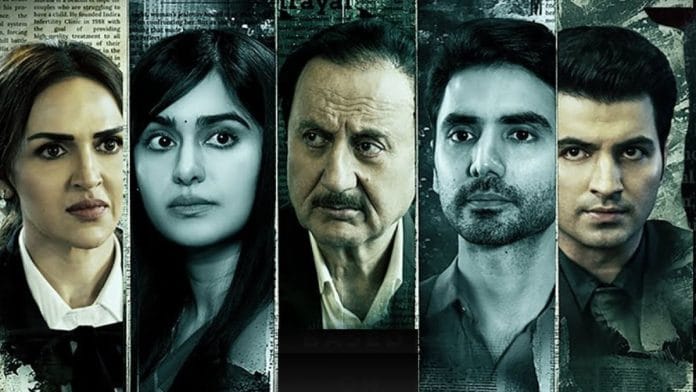New Delhi: Vikram Bhatt’s Tumko Meri Kasam, set to release on 21 March, brings the life and love story of Dr Ajay Murdia, the founder of Indira IVF—India’s largest chain of fertility clinic—and his wife Indira Murdia to the big screen.
The Kerala Story actor Adah Sharma steps in to play Indira, a character she describes as “optimistic in tough times,” someone who “sticks by” and genuinely celebrates her partner’s success.
But, the key message Sharma hopes people take away from the film is, “Infertility doesn’t make you any less of a man or woman,” she told The Print.
Though the 32-year-old was already familiar with the concept of IVF, she delved deeper into it for her role.
“IVF isn’t about what God can’t give; it’s a medical issue,” she said. “It’s like diabetes—if your body can’t produce insulin, you take medicine. So why can’t male infertility be treated the same way?”
Ishwak Singh portrays the young Ajay Murdia, while Anupam Kher steps in as the older version of the character.
Sharma recalled Kher sent her an over three-minute-long voice note after watching her performance as Indira Murdia.
“I have listened to it several times and even made my mom and people around me listen to it. When an actor of his calibre appreciates you, it’s beyond words,” she said.
Along with his praise, Kher also gave her a key piece of advice: “Focus on your marketing.”
He emphasised how, in today’s world, talent alone isn’t enough for an actor—you need to know how to market yourself effectively, recalled Sharma, who has previously worked with him in Hum Hai Raahi Car Ke (2013).
In Tumko Meri Kasam, Sharma also reunites with filmmaker Vikram Bhatt after 14 years. She made her debut with Bhatt’s 2008 horror film 1920, her second film Phhir (2011) was written by Bhatt.
While she didn’t experience anything drastically different from her last visit to Bhatt’s set, Sharma admitted that before the first shoot, she couldn’t sleep.
“When I first met him, I was raw. Now, after doing so many films, I like to believe I’ve grown as an actor,” she said.
Recalling her first shot on Tumko Meri Kasam, Sharma revealed that Bhatt was moved to tears.
“His words to me were, ‘You’ve grown leaps and bounds’,” she said. “That night, I finally slept well.”
Also read: IVF, adoption, single parenthood—3 ‘unconventional’ mothers discuss who ‘good’ & ‘bad’ moms are
Won’t play it safe
Sharma isn’t one to play it safe. Whether it’s the flamboyant Karisma Solanki in Hasee Toh Phasee (2014), the quirky bar dancer Rosie Mehta in season 2 of Sunflower (2024), or the no-nonsense cop Neerja in Bastar: The Naxal Story (2024), she refuses to be boxed into a single kind of role.
Experimenting with genres and characters has been her thing since day one—sometimes it’s paid off, sometimes it hasn’t, but she has zero regrets.
“I don’t know how to play safe. It’s not my game,” she said. “I go with my gut and follow my heart when choosing projects.”
After The Kerala Story (2023), many advised her to stick to serious roles. Instead, she took on Sunflower, playing a bar dancer, and then jumped into Reeta Sanyal (2024) because she wanted to explore the comedy and fantasy genre.
While Sharma has dabbled in OTT projects like Pati Patni Aur Panga (2020), The Holiday (2022), and Commando (2023), cinema remains her first love.
“The experience is unmatchable,” she said. “In Commando 2 (2017), the whistles at my entry, the buzzing chatter in the hall—those moments are electric. Or in 1920, when the Hanuman Chalisa played every time I was possessed—it was surreal.”
That said, OTT has been a “lifesaver” for Sharma and many others in the industry.
“Without it, we’d be stuck with three big production houses giving opportunities to only a select few,” she pointed out.
Seventeen years in the industry has given Sharma a thick skin, especially when it comes to critics. But these days, she values social media audiences more than traditional reviewers.
She credits everyday people, the so-called “non-critics” on social media, for making The Kerala Story a success.
The critics had rated the film negative five stars and called her “unfit” for the role, while some couldn’t imagine anyone else in that character.
“Eventually, I had to embrace the love,” she said. “Soon, the negativity just became background noise.”
With no billboards, TV promos banned, and the film itself facing bans in certain parts of India, it was word of mouth and viral reels that drew audiences to theatres.
“They may not be ‘esteemed critics’, but they’re the ones who made my film work. And for that, I’m grateful,” Sharma said, adding, “I love that the lines between elite critics and the common audience are finally blurring.”
(Edited by Theres Sudeep)






